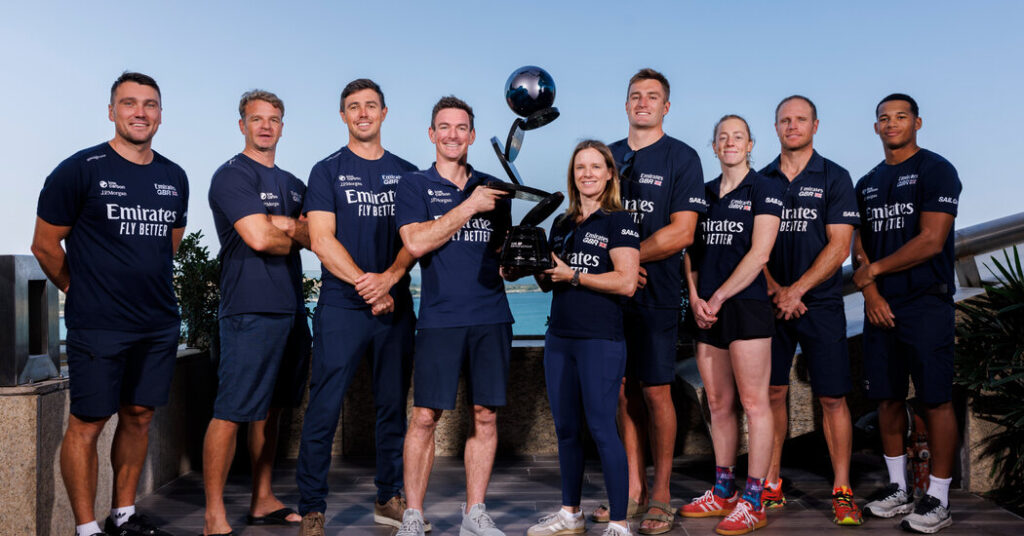SailGP calls it the Podium for the Planet.
While the professional sailing league’s Mubadala Abu Dhabi Sail Grand Prix 2025 Season Grand Final, which will take place in the United Arab Emirates’ capital this weekend, will determine SailGP’s Season 5 championship title and its $2 million prize, a second trophy and purse will also be awarded by the series to the Emirates Great Britain SailGP Team and their main partner, the 1851 Trust.
The Impact League is a series within a series that challenges SailGP teams to engage in projects to help protect the environment and foster inclusivity within the sport. Athletes and officials said this parallel league was competitive, with many teams maneuvering to win.
But unlike Season 5’s championship title, which will be determined in a single winner-takes-all race on Sunday, Emirates Great Britain’s second consecutive Impact League win is the culmination of their season-long efforts.
The Impact League was created during SailGP’s second season, which began in 2021. Fiona Morgan, SailGP’s chief purpose officer and a driving force behind the creation of the Impact League, said that its goal was to embed sustainability and social and environmental thinking into the way SailGP athletes and teams operated.
SailGP hopes to inspire other sports to take similar steps.
SailGP rules require that all teams participate in the Impact League. Each team competes with a main partner — typically a nongovernmental organization — that is vetted by SailGP. According to SailGP, for example, the Mubadala Brazil SailGP Team, with its partner Nas Marés, an ocean conservation organization, employed more than 40 local fishermen to clean up and recycle or dispose of about 9,000 pounds of plastic waste from Rio de Janeiro’s Guanabara Bay.
Teams, their partners and sometimes their sponsors create and collaborate on projects that must address each focus area: waste reduction, climate action, accelerated inclusion for underrepresented groups within sailing and advancing gender equity in SailGP leadership roles. The league said the British team won this season’s Impact League after achieving podium results in all four focus areas, including the expansion of its youth development program and working with the 1851 Trust to deliver inclusion education to young sailors.
Additionally, SailGP has 10 so-called business-as-usual criteria, including reducing electricity consumption at team bases during events, and diversity, equity, and inclusion efforts that all teams are expected to follow.
SailGP teams and their partners have created more than 150 projects.
“They’re not just kind of flash in the pan,” said Hannah Mills, Emirates Great Britain SailGP Team’s strategist and a two-time Olympic gold medalist. Her team won last season’s trophy for helping to develop a portable solar array and wind turbine that provided electricity for her team’s base at SailGP events, and which also returned excess energy to the event’s temporary grid.
“That was one of our projects we’re really proud of,” Mills said of the solar and wind array, adding that the team created a blueprint of this effort for other sports teams to replicate. The project was carried out with Low Carbon, a renewable energy company.
While Impact League results are determined by guest judges based on each team’s efforts across the four areas, Morgan said that failure to satisfy the business-as-usual criteria could result in point deductions.
“We’re spending quality time really diving into each project,” said Kelvin Beachum, an Impact League guest judge and an offensive tackle for the Arizona Cardinals in the N.F.L. “You can see it, you can feel it, you can sense it when it’s authentic and when it’s not.”
Morgan said that while teams could have more than one partner, only one could receive the prize money.
While SailGP’s cumulative Season 5 racing purse is $12 million, the Impact League will award $150,000 over the season. The British team will receive $25,000; the Brazil team, which finished in second place this year, gets $15,000; and the Canadian-flagged NorthStar SailGP Team wins $10,000.
“What an achievement for the Emirates Great Britain SailGP Team, winning the Impact League for the second year running,” said Morgan, who called it a standout example of the team’s long-term commitment and passion to drive change. “Their consistency and leadership set a powerful example of what’s possible when purpose and performance go hand in hand.”
Additionally, the winners in each of the four areas will receive $13,000, while second place gets $7,000 and third place gets $5,000.
“One day we would like to match that with the on-water racing trophy,” Morgan said. “It’s more about, I suppose, the change you create and athletes using their voice than the monetary amount, although, of course, I would love a huge amount going back into Impact.”
Morgan acknowledged that the Impact League won’t solve the planet’s environmental or social challenges, or offset SailGP’s environmental footprint, which includes shipping 100-plus containers to events, and athlete and fan travel. “It’s not the aim of the Impact League,” Morgan said. Instead, she said, the league represented a tangible and valuable element that could be embedded into sports.
This value stretches far beyond SailGP events.
“Most of these initiatives, we actually don’t do at SailGP,” said Tim Hornsby, a grinder for the Canadian team. He explained that teams often conducted their Impact League projects at home, rather than at events: “You see people hitting these projects all over the world, which is exciting.”
Some recent Impact League projects included mobilizing support for a marine protection bill in New Zealand; developing a biodegradable, high-performance tape made from oyster shells; planting eelgrass shoots at Halifax, Nova Scotia; and developing seaweed agriculture in Brazil.
Projects aside, professional athletes like winning. “The rivalry in the Impact League is pretty high,” Mills said. “I think if you want things to happen, you put a competition in there and things start to happen. That’s definitely a good way to motivate athletes.”
Historically, however, this motivation has sometimes crossed the line. “There’s been cheating, there’s been protesting, there’s been arguments,” Morgan said of the Impact League’s early years, when teams were evaluated just on the 10 business-as-usual criteria.
Morgan described infractions involving teams plugging power cables into other teams’ event bases, emptying their garbage into other teams’ bins, or capturing spy photos of other teams’ athletes with single-use plastic water bottles.
“They protested for everything because they all wanted to win so badly,” Morgan said, explaining that protests have since been eliminated. “We said, ‘Look, it’s not about protesting, it’s about positive impact. Let’s refocus, and let’s keep going.’”
Shifting from the business-as-usual criteria to the four focus areas this season was part of SailGP’s broader push to streamline and strengthen the Impact League. Mills and Morgan said this structure also gave teams more leeway. “Some teams care about oceans, some teams care about gender equity,” Morgan said. “But I think they care about the Impact League.”
Looking ahead, Morgan said she would like to see an Impact League for SailGP fans and greater adoption of similar programs by other sports leagues.
“We want other sports to be inspired and take on the concept,” Morgan said. “I know there’s a lot of other organizations looking at it.”
However, Beachum noted that SailGP had some advantages when it created the Impact League. “I really feel that it’s a holistic approach that has to happen,” Beachum said about the possibility of other professional sports following SailGP’s lead. “I think that’s what makes SailGP so special,” he added, describing the way the Impact League grew in tandem with SailGP’s racing, rather than being tacked on to an established league.
Sailors also said the Impact League had influenced their mind-sets.
“It’s kind of changed everything for me,” Hornsby said. “It’s often unglamorous, but it’s like, you know, truly reflecting on where you sit in all of it and how you can be a part of the change.”
Likewise, Mills said she constantly thought about her own life and the actions she could take to effect change. “As athletes, we do have a voice, and I think we have the responsibility to use that to try and push the change,” she said.
Morgan said that multiple teams were pushing to become the first to capture SailGP’s double crown. And given the British team’s second consecutive Impact League win and its current standing atop the league’s on-the-water racing leaderboard, this could happen this weekend.
“Imagine one team winning both trophies,” Morgan said. “I think that would be a pretty iconic moment in sport.”
The post A SailGP Competition With a Social Conscience appeared first on New York Times.




